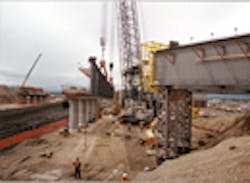With a federal fuel tax considered by most experts to be a dead issue given the current political climate on Capitol Hill, transportation policy-makers tougher choices ahead regarding how to allocate increasingly scarce funding for roads, bridges, rails mass transit, ports, etc.
“There’s strong opposition to tax increases on fuel” right now in Congress, Emil Frankel, director of transportation policy for the Bipartisan Policy Center (BPC), told FleetOwner.
“The problem is we also have very scarce resources in terms of funding all our transportation infrastructure needs,” he added. “That will require a lot of tough choices to be made, so we focus these limited resources on projects that really benefit the national interest.”
The BPC's National Transportation Policy Project, along with the National Surface Transportation Infrastructure Financing Commission, recently released a joint statement to the Obama Administration and the Congress stating that it will be critical going forward to “maximize the reach and impact” of what is spent on transportation projects.
“Otherwise we will continue to get the same results: deteriorating infrastructure marked by unacceptable compromises to safety as well as worsening performance, especially growing congestion,” the groups said.
BPC referred to suggestions within its so-called “blueprint for surface transportation reform” released in June 2009. It is actually titled Performance Driven: A New Vision for U.S. Transportation Policy and emphasizes two key points for transportation policy-makers going forward.
The first is to use “targeted investments” in the transportation system from all levels of government and the private sector so they are strategically focused on achieving long-term benefits, be they i economic growth and competitiveness, improved national connectivity, rural and metropolitan accessibility, as well as the promotion of energy security, environmental sustainability, and personal safety.
Second, more exact user fees b ased on vehicle miles traveled (VMT) need to be implemented along with increased federal motor fuel taxes. That way, users will bear more of the full costs of the infrastructure they demand – including congestion, pollution, and other indirect impacts.
Finally, BPC cautioned that while alternative financing mechanisms and public-private partnerships are highly useful, they are not substitutes for actual revenues.
“Recognizing the urgency of this issue and scarcity of available public resources, we are calling for federal transportation policy to be tied to goals that advance economic, environment and safety objectives,” said Senator Slade Gorton, co-chair of the BPC's National Transportation Policy Project.
“Current fiscal constraints further highlight the need for our system to be self-reliant and funded by user-based fees,” he added. “We should not and cannot allow the nation's transportation system to continue to be a burden on our national budget.”
"America's roads, bridges and transit systems form the foundation of our economy and our quality of life,” echoed Kathy Caldwell, president of the American Society of Civil Engineers (ASCE).
“Now, as many of those critical systems are sliding closer and closer to failure, we are getting hit with the harsh reality that treating the problem with short-term policy solutions and 'band aid' funding measures hasn't been successful or beneficial to our long-term outlook,” she said.
"Investing in infrastructure will never be cheap, and having that conversation while families and businesses are struggling will be difficult,” Caldwell pointed out. “However, we must remember that failing infrastructure is already having an impact on the wallet of each and every American, whether it's in wasted fuel, declining productivity or increasing costs for everything from milk to blue jeans. This isn't a Republican issue or a Democrat issue. It's an American issue, and we have to demand that it be treated as such.”
About the Author
Sean Kilcarr
Editor in Chief
Sean Kilcarr is a former longtime FleetOwner senior editor who wrote for the publication from 2000 to 2018. He served as editor-in-chief from 2017 to 2018.
